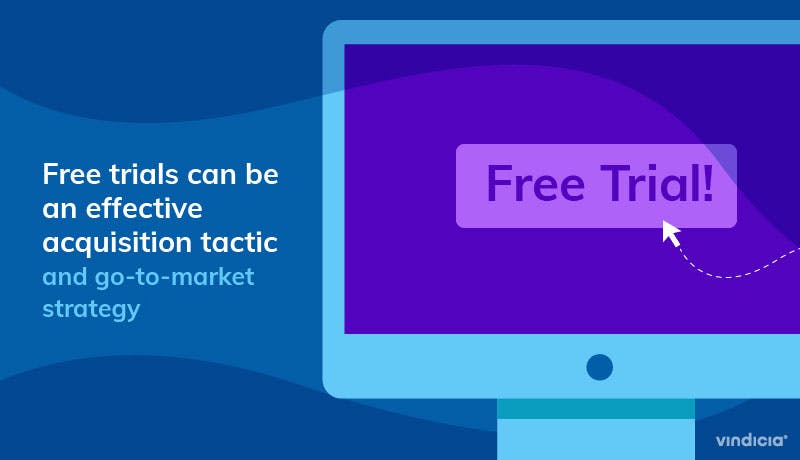Blog
February 18, 2020 | Authored by: Vindicia Team
The complexity of billing after a free trial expires
Offering free trials can be a successful acquisition strategy for subscription businesses. However, making it an effective tool requires adhering to billing best practices — which are quickly changing when it comes to free trials. Automatically billing at a full price upon trial expiration has become a flashpoint as consumers protest and the payment industry responds.
What happens after a free trial ends is a make-or-break proposition, and billing is especially complex at this point. Let's explore what your business should know.
What's the issue?
Subscription businesses want to start generating revenue as soon as they can. The longer they offer free services, the longer it takes to realize a profit on the customer. It's also a bit high stakes: Companies devote resources to the acquisition but aren't guaranteed that a customer signs up at the end of the free trial. The upside of free trials is that the customer already has one foot through the door. Still, many people game the system by starting accounts with different contact information to string together free service.
Given these risks, subscription-based businesses often start billing at full price as soon as the free trial ends. Companies include notice of this stipulation when customers sign up for the service, but the automatic charge at full price has become a friction point. Customers generally feel as if additional consent or notice is required before automatically charging at full price — and the most influential players in the payment industry are changing to reflect that position.

Mastercard and Visa adopt new policies
In response to this new development in payments, Mastercard and Visa have updated their policies and guidelines for processing payments related to free trials. These changes, in effect, will place a greater operational burden on some subscription-based merchants, adding steps to a billing process that is already complicated and tightly coordinated.
In January 2019, Mastercard announced that it will require merchants selling physical products via subscription (for example, skincare or beauty items) to obtain cardholder approval before billing at the full price once the free trial ends. The company explained that this was done in the interest of fostering a hassle-free experience, but also as a way to increase transparency in free trials. In addition to securing consent, merchants will also need to send cardholders information on the transaction amount, the scheduled payment date, the merchant name, and explicit instructions for canceling a trial. Enforcement is expected in April 2020.
But the increased responsibilities don't end there: "For each payment thereafter, the merchant will have to send a receipt to the cardholder for each transaction by email or text message with clear instructions on how to cancel the service if the consumer so desires ... all charges that appear on the cardholder’s statement must now include the merchant website URL or the phone number of the store where the cardholder made the purchase," Mastercard said.
In June 2019, Visa similarly followed suit. It announced a new policy related to acceptance, disclosure, and dispute policies for transactions on free trials or introductory promotions that would enable easier cancellation and greater customer recognition.
The Visa change affects subscription-based merchants that sell physical goods, as well as those that sell digital services. Also, the new policies will apply to up-sell transactions, as well as negative option billing for free trials.
On April 18, 2020, merchants must:
- Provide a digital, self-service option for cancellation
- Obtain explicit consumer consent to upgrade a free trial to a paid account (or add upsold features)
- Send detailed information to support decision-making, including:
Merchant name
Description of goods or services
Length of a free trial or introductory period
Full disclosure of charges that will follow if subscription continues
Transaction date or date trial offer begins
Initial transaction amount, if any
Date and amount of any subsequent transactions
Cancellation policy and instructions on how to cancel
Tokenized card number (last 4 digits)
Name of any upselling merchants involved - Merchant name
- Description of goods or services
- Length of a free trial or introductory period
- Full disclosure of charges that will follow if subscription continues
- Transaction date or date trial offer begins
- Initial transaction amount, if any
- Date and amount of any subsequent transactions
- Cancellation policy and instructions on how to cancel
- Tokenized card number (last 4 digits)
- Name of any upselling merchants involved
- Disclose to recurring customers on how their payment information will be stored, expiration of the subscription, and how they will be notified of changes
Addressing the complexity of billing after a free trial
While the changes are aimed at driving positive change in how free trials are marketed, sold, and used, they amount to substantially increased responsibility for subscription businesses. Billing for a free trial was already complicated, to begin with, both practically and functionally. With these added considerations, subscription-based merchants will need to be ready by April 2020 to meet all the compliance mandates instituted by the two biggest payment players in the world.
Businesses that need the tools to optimize free trial billing or the expertise to ensure compliance can contact Vindicia for help. As subscription experts, we have years of experience and a robust subscription billing and management solution to drive performance and customer excellence. Need help getting your operations in line for new disclosure and billing requirements? Get in touch today.
About Author

Vindicia Team
We value our subject matter experts and the insights each of them brings to the table. We want to encourage more thought leaders to come together and share their industry knowledge through our blog. Think you have something interesting to contribute as a guest blogger? Contact us at info@vindicia.com